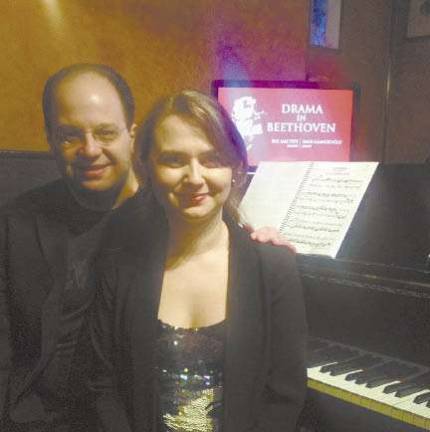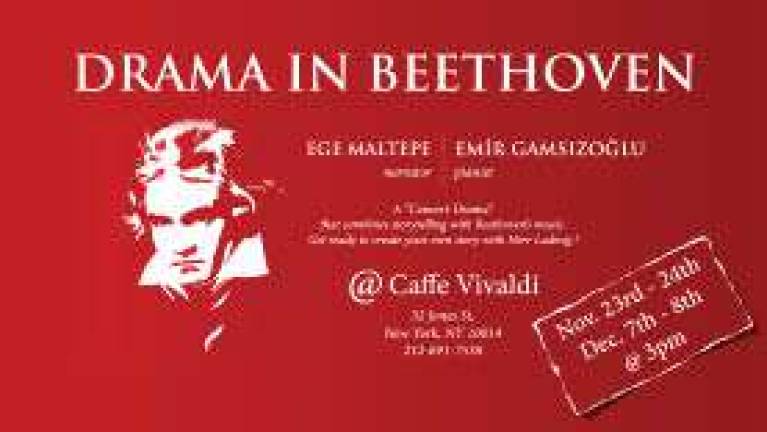Striking a Chord with the Younger Generation



Husband and wife duo - and huge Beethoven fans - put a new spin on the classics at Caffé Vivaldi
[](http://nypress.com/wp-content/uploads/2013/12/Celeb_Couple_opt.jpeg)Classical music can really bring out the creativity in a couple. Ege Maltepe, an actress from Istanbul, and her husband Emir Gamsizoglu, a Turkish pianist, decided to move to New York City to pursue their artistic aspirations. They credit Gamsizoglu's constant playing of classical music in their Upper West Side apartment as one of the reasons they created Drama in Beethoven, which they are performing this winter at Caffé Vivaldi in the West Village. Maltepe, 30, narrates the show using humorous anecdotes taken from their life. Besides their own personal stories, the couple interweaves intimate tales of classical composers, in the hopes of linking the genre's past to the youth of today. "We can't follow Beethoven on Twitter but we can still find a way to create a connection," Maltepe said. While his wife takes care of the theatrical component of the evening, Gamsizoglu, 40, provides the soundtrack. While he is playing, the audience is asked to visualize stories, some the Beethoven-themed creations of the couple, and others inwardly thought up by the guests. Since classical music does not have lyrics, envisioning these scenarios connects people to the music in a powerful way. This concert drama is just part of the couple's movement aptly named "classical4all," which includes classical music appreciation classes Gamsizoglu teaches in their apartment. Maltepe said of their mission, "As artists, we are responsible for thinking of how to communicate what we do to reach new audiences." Gamsizoglu agrees, saying, "The way classical musicians present should be closer to our time, to keep up with the people of our generation."
Why did you choose Beethoven as your show's subject?
Ege: He is the bridge between two periods in music history, classical and romantic. His work is very powerful, very passionate.
Emir: You can find both classical and romantic aspects in his music, which covers a lot of different tastes. That's why he's been popular for the last 300 years.
[](http://nypress.com/wp-content/uploads/2013/12/Celeb_Poster_opt.jpeg)Why are some young people's perception of classical music wrong?
Emir: It's not wrong, but in a world of so many genres of music, it's difficult for classical music to reach to audiences compared to others, because it deserves a little bit more effort to get into it. Most classical music concerts are followed by the older generation. Not the content, but the presentation should improve for the younger generation.
How do you accomplish that goal of reaching a wider audience with this show?
Ege: At our first show this year, a little kid came just to listen to Emir and he was so into it. First of all, we don't present in a concert hall, but in a café. It's very casual; you don't have to dress up. You can enjoy food and drink while listening to us. It's a new thing we call a concert drama, but it's not really dramatic, it's more funny. We are using the power of stories, which is very engaging with the audience.
What kind of stories do you tell during your show?
Emir: The stories are about Beethoven's work and life, stories we make up off his work, and stories that Beethoven was inspired by, like Shakespeare's play, The Tempest. When they hear these stories, the audience gets more engaged in the music.
How did you start your partnership with Caffé Vivaldi?
Emir: A few years ago, we bumped into it on the internet and wrote to the owner, Ishrat Ansari. He said that he always wanted to have a classical recital in his café. So I did a Chopin recital there in 2010. He asked me to keep playing whenever I wanted.
Emir, you were a basketball player. Why did you switch careers?
I had an injury and was so bored healing at home that I was ready to try anything to get rid of my boredom. Just by chance, my mother is a ballet teacher and was playing a Chopin waltz. I tried what she played and she was shocked that I was able to do it without any education. In a year's time, I auditioned for a conservatory in Istanbul and was accepted. I ended up in Paris playing with great musicians a few years later.
How old were you when you took your first piano lesson?
Emir: Twenty.
Ege: [Laughs] He says it like it's normal!
[](http://nypress.com/wp-content/uploads/2013/12/side3.jpg)How did you meet?
Ege: Through mutual friends. I graduated from an acting school in Turkey and a close friend of mine was dating a famous actor there, Memet Ali Alabora. Emir was a very good friend of his. I then got a Fulbright Scholarship to come and study here for my masters in acting. Emir said, "If you want me to, I'll just come to New York because I'm a classical pianist and my job doesn't have a language."
As Europeans, what is your perception of the music scene in New York?
Emir: Like many Turkish and European snobs, before I came here, I looked down on the American classical music business. But now, I'm a very passionate fan of the way American culture presents classical music in the 20th century. I can't speak for the other genres, but for classical, if we look at the greatest composers of the 20th century, all of them lived in the United States, most of them in New York. If we still have classical music in the world, part of the reason is the marketing ability of the American music business. I wish European musicians were more aware of this fact.
Where do you go to listen to classical music here?
Emir: The New York Philharmonic is one of the oldest orchestras in the world. Actually, after Alan Gilbert, they started to play like they were during Leonard Bernstein's time. Last year, Fora Baltacigil, a Turkish friend of mine, became the lead double bass there. After him, it's more fun for me to go listen.
Ege: Bargemusic, a barge right under the Brooklyn Bridge. It's an intimate concert experience. And when you get out, you see Manhattan.
Ege, tell us about your acting background.
Ege: I got accepted to the New Actors Workshop. The director Mike Nichols was one of my teachers there, and one of the founders of the school. One of the acting techniques I learned, Spolin Improvisation, is the work of a genius American drama teacher, Viola Spolin. After I graduated, I decided to translate Viola's book into Turkish and spread her work in Turkey. Since 2009, I go back and forth to my home country and lead workshops there.
What are your future plans?
Ege: With the theme of classical4all, we are starting to brainstorm on a project about Shubert. I'm going to start a series of Spolin Improvisation workshops in New York City for writers, actors, businesspeople, anyone who's interested. Emir has an album coming out, Alla Turca Around the World.